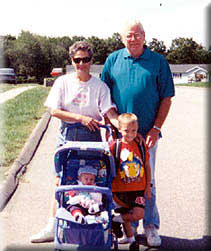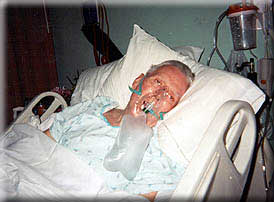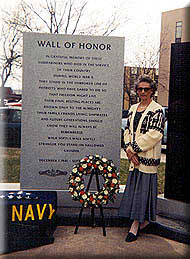Beyond The Call Of Duty
James "Kimo" Ward is a 65 year old retired United States Navy Submarine Sonar Technician (Electronics Branch), who is proud to have served his country, with honor, dignity and courage. He is a man with all of these qualities, and more -- a sailor who always performed above and beyond the call of duty.
Even after a distinguishing 22-year career in the Navy, Jim remained attached to the service, working as a civilian employee in a defense contractor's electronics department whose sole-source contract was with the Department of the Navy. Every year Jim looked forward to his reunion with his Navy brothers and their famiiles, especially those families who lost loved ones on the SSN Thresher.
Devotion to Crew of SSN Thresher
Jim was a part of the original crew of the SSN Thresher, the prototype for all subsequent attack submarine classes. She was the first quiet and deep-diving submarine, and was launched in 1960. In April of 1963, while docked in Groten, Connecticut, Jim disembarked the Thresher days before she put out to sea in the company of the Submarine Rescue Vessel Skylark (ASR-20). The submarines were to perform deep-diving exercises. In addition to her sixteen officers and 96 enlisted men, the Thresher carried seventeen civilian technicians to observe her performance during the deep-diving tests.
Fifteen minutes after reaching her assigned test depth, the submarine communicated with Skylark by underwater telephone, apprizing the submarine rescue ship of difficulties. Garbled transmissions indicated that far below the surface, things were going wrong. Suddenly, listeners in Skylark heard a noise "like air rushing into an air tank"--then, silence.
Efforts to reestablish contact with Thresher failed, and a search group was formed in an attempt to locate the submarine. The Navy Rescue ship Recovery (ASR-43) subsequently recovered bits of debris, including gloves and bits of internal insulation. Photographs proved that the submarine had broken up, taking all hands on board to their deaths in 5,500 of water, some 220 miles east of Boston. Thresher was officially declared lost in April, 1963.
Jim lost many good friends, and vowed to never forget their memory. He was active in the annual reunions of the Thresher and its families. He kept in touch with the widows, children and grandchildren of some of the crewmen who perished aboard the Thresher.
He was looking forward to the 40th reunion in 2003, and felt nothing could keep him from it. Unfortunately, he never saw the mesothelioma coming.

Too Weak to Wrestle with Grandkids
Jim and Eleanor have been married for nine years. A Licensed Practical Nurse, Eleanor recognized around Christmas time that Jim was not his normal self. Jim's troubles began in early January of this year, when he began to feel shortness of breath and pain in his side. A grandfather of seven, Jim could no longer pick them up or playfully wrestle with them; he knew it was time to see a doctor.
Jim made an appointment and met with Dr. Steven Curland, who suspected pneumonia after reviewing Jim's chest films. Dr. Curland prescribed antibiotics and sent Jim home.
Towards the end of January, Jim had a prolonged, severly painful coughing episode. He went to the emergency room at the Backus Hospital in Norwich, Connecticut. Additional chest films and a CT scan showed fluid on his lung. The films also showed a "spot" on the lung. A surgeon then performed a fine needle biopsy, which resulted in a diagnosis of mesothelioma. The tissue specimens were sent to IMPATH laboratories in New York, which confirmed the diagnosis.
Short List of Top Treatment Hospitals
Dr. Curland provided the Wards with a list of area hospitals to contact for treatment options, which included Sloan Kettering, Yale University, the Hartford Hospital and Brigham & Women's in Boston.
The Wards first contacted Yale University, which informed them the first available opening for consultation was not until March. Jim was sent to the Hartford Hospital and after three days there, they contacted Brigham & Women's and met with Dr. Scott Swanson on March 12, 2001. After reviewing all of Jim's medical records, Dr. Swanson informed the Wards that Jim qualified for an extra-pleural pneumonectomy (EPP). Jim and Eleanor felt comfortable with the staff at Brigham & Women's, and decided to go forward with the radical yet time-tested surgery. After two months of searching for a treatment -- valuable time during which the tumor was building its deadly strength-- the Wards had finally found and enlisted a strong ally to fight back.
Fiddling while Rome Burns
On March 12, Jim and Eleanor returned to Boston for pre-operative testing. His EPP was scheduled for March 15. At that time, Dr. Swanson informed them that he and his staff were not pleased with the tissue specimens and stains provided from Backus Hospital. Despite several independent pathology reports which confirmed the diagnosis, he said he wanted additional tissue for diagnostic purposes. Instead of the EPP on March 15, Mr. Ward was to undergo an open lung biopsy. Needless to say, the Wards were frustrated. They understood that the doctors wanted to be sure of the diagnosis before removing the lung, but they felt that they were now three to four weeks behind in their treatment schedule. The water was slowly leaking into the submarine.
The surgery went as planned on March 15. Jim suffered post-surgical complications. His blood pressure became very low, he began to hemorrhage and was in respiratory distress. He remained in intensive care into the weekend and finally stabilized enough to be sent home that Sunday evening.
Complications Post Surgery
The following Wednesday, Jim went into acute respiratory arrest and was sent via ambulance to the emergency room at Backus Hospital. That night he was in tremendous pain. A CAT scan was taken which showed a large buildup of fluid in his lung. His doctors considered a nerve block to alleviate the pain. Jim was fed through an IV.
A former high school basketball player standing 6' 5", in the last three months, his weight plummeted from 250 pounds to less than 200 pounds. Jim was also a scholar athlete and class valedictorian.

Rather Perish with His Sub Mates
During that terrible night, Jim looked at Eleanor and told her that if he had known how much pain he would endure the month past, he would rather have perished with his shipmates aboard the Thresher. It all seemed so pointless. Where was the leadership? What was the battle plan? Why are we taking recon photos of the invading army when it's already stormed the gates and has hunkered down comfortably inside the castle? In the meantime, the pathology report from Boston confirmed the diagnosis of malignant mesothelioma, which came as no surprise.
On March 28, Jim was placed on "comfort measures" at the Backus Hospital. His body is weak. He remains unusually quiet. His skin has taken a yellow tinge; his hands, feet and knees are swollen. When he does speak, he looks lovingly at his wife and asks her to "be strong." His grandchildren do not understand why grandpa does not take their hand when they offer it to him. His family is very angry, and can only ask, "Why?"
22 Years of Proud Service
According to Eleanor: "We went from being very happy, with everything right, planning on traveling to California to visit family, and then to the Cayman Islands . . . to this. The carpet has been pulled out from under us and our life is turned upside down. Never in a million years would we have predicted this. Jim gave 22 years to his country, and this is what he got."
James Ward passed away on April 1, 2001. His last two days alive, he suffered immensely. Eleanor told us that "no one should have to endure that much pain or respiratory distress - Jim suffered both."
James will be buried with full military honors, as he should.
'Final Patrol, author unknown.'
Lord, this departed shipmate, with Dolphins
on his chest, Is part of an outfit known as the best.
Make him welcome and take him by the
hand, You'll find without a doubt he was the
best in all the land.
So heavenly Father, add his name to the
roll, Of our departed shipmates still on
patrol.
Let them know that we who survive, Will
always keep their memories alive.
 *** POSTED APRIL 27,
*** POSTED APRIL 27,


